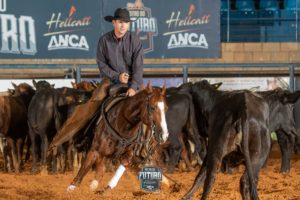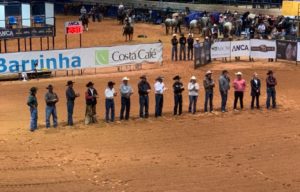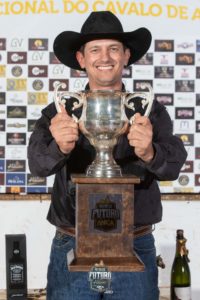
Luis Fernando Taboga rode JSA Comanche Way to a 75 claiming the Open Futurity last month in Brazil. Photo by: Adilson Silva
The Amazon rainforest, stunning beaches and colorful festivals come to mind at the mention of Brazil. But Brazil also has a rich ranching history and a growing cutting horse industry.
After working for Beau Galyean for two short years, Brazilian trainer Rodrigo Taboga has amassed close to a million dollars in winnings and numerous championships under his belt.
He got his start in Sao Paulo, riding cutters on his father’s ranch and competing in the Associação Nacional do Cavalo de Apartação, the Brazilian affiliate of the NCHA, which was founded in 1989.
The ANCA has 315 active members who compete in the same classes as the NCHA.
“It has been growing every year, comparing our Futurity 2021 with this year 2022, we had an increase of 34% in the entries, going from 123 to 165, the entries for the national had an increase of 61% compared to the year 2021, which shows a large increase…”ANCA President, Ricardo P. Backheuser Júnior said.
Brazilians seek out many of the top stallions in the US to breed to, such as Metallic Cat, Smooth Talking Style, Hashtags, Once In A Blue Boon, NRR Cat King Cole and Hottish. Ricardo Guerra Villaca is a veterinarian focused on breeding. He spends half the year in Texas at SDP Buffalo Ranch in Fort Worth doing the breedings for them and then does the breeding in Brazil the other part of the year.
“Through frozen semen we’re able to use all the good studs in America,” Villaca said.
He also added that a few of Brazil’s own studs, Tilly Playboy and Moms Silverado Cat, are doing really well and winning futurities.

The 2022 ANCA Futurity Finalists Photo from: Ricardo Guerra Villaca
“[In] 2009-2015 they bought a lot of mares here [in the States] and took over there [to Brazil]. We have good quality bloodlines over there…Every year they bring new studs over,” Taboga said.
At the Brazilian Futurity there will be anywhere from 80-100 horses. The major show was held in June where Tabogas’ brother, Luis Fernado Taboga won it with a 75, collecting a check for $R 37.850,17. The ANCA hosts a Super Stakes in October as well as a Derby in March and a Challenge, much like the World Finals.
Villaca also owns cutting horses. “I’m passionate about bloodlines and the history of cutting. I love a good equine athlete and I think cutting horses are the top equine athletes compared to any other equine sport. It’s something that not every horse can do. I’m involved in the whole industry from breeding the best individuals to raising the babies starting colts and enjoying watching them go to the cutting show and be winners. Once you get involved you’re not going to be able to leave. I got that virus!” Villaca said.
Backheuser said the ANCA is excited about its growth. “This year the show season was great, with an increase in entries and many shows. This week from June 22 to 26 there’s the Futurity and National Championship, we will also hold a course for new judges with the master Andy Adams,” he said.
Taboga said a cutter in Brazil can show twice a month. It will involve some traveling of around two to five hours, and some are further.
“[Each year] four official [ANCA] shows and about 16 [sanctioned] ones,” Backheuser said.
Like the NCHA, they have the Open, Non-pro and Amatuer divisions with a leveling system to even the playing field. They also have two members who have earned over a million raeis. Antonio Sergio de Araújo R$ 1.388.509,56 and Aroldo José Marcelino R$ 1.049.383,06. Brazil has a population of 211 million people and a cattle population of 252 million, or 1.2 cows per person, which is one of the highest ratios in the world. Ironically, Taboga said, it’s hard to get cows.
The owners aren’t keen to move them to the pasture because they can lose weight. He said that eventually his family proved that they took really good care of the cows and kept weight on them. He said the ACHA works out cattle lease deals with the ranchers. Taboga said the paperwork required to move cattle to and from any ranch is extensive, which can be another hurdle.
They use Brazilian Brahman which are like large zebus and they are starting to cross them with angus. Taboga said the cows are very fast so they have to take more time to settle them.
According to Taboga, the ACHA has no issues getting good judges and a few times a year the association brings US judges over to stay up to date. “[Judges] always teach something [when they come over from the States]. They tell everyone if they need to fix something… We have a lot of influence [from the States] in Brazil,” Taboga said.

Luis and his Futurity trophy. Photo by: Adilson Silva
Numerous US based trainers have traveled to Brazil to teach cutters there such as Jody Galyean, Ascencion Banuelos, Matt Gaines, Clint Allen, Spud Sheehan and even Graham Amos from Australia. Banuelos has been out to Brazil about 15 times according to Taboga and some of the others have been out two to three times to coach and advise. But it’s been a while since trainers traveled to the South American country, due to COVID.
According to the ANCA, COVID “was very difficult. The shows were suspended and when [they restarted] without [spectators] and with covid tests, everyone kept hope and continued training. The ANCA launched a campaign “Apartados mas apartando” [roughly translates to ‘being apart’] featuring interviews with trainers to send a message of hope to everyone, so that they could continue training the animals so that when the shows came back, they would all be ready for it.”
“I am trying to be a bridge between the trainers there. Last year I brought a couple friends that are trainers…to be catch riders in the Futurity. And give them a chance to see how the cutting world is over here. How big, how hard and how competitive and how good it is too. I like to compete and show horses. Here it is very competitive and because of this, the competitive world is very good,” Taboga said.
Taboga said horse prices are up in Brazil and people will pay hundreds of thousands of Brazilian reais for cutting horses. “A good gelding will be 70 thousand [reais]. It’s the same as [the States] just in reais,” Taboga said.
“The horse sales are going very well, we have in Brazil great breeders such as Renato Eugênio Rezende Barbosa from Campanário Farm that recently received the AQHA International Best Remuda title and Gruta Azul Farm headed by Norberto Soares Leite, who has the help of his daughter, Patricia Arakaki Leite Miglioli,” Backheuser said.
Taboga said the entries are around R$ 2500. While that is the equivalent of around $500, on a relative scale to the cost of living, it’s a similar amount for locals as it is for cutters in the States.
Taboga said one of the main differences between the two countries is the level of sponsorship. Brazil doesn’t have as much which means prize money is also lower. “We don’t have a lot of winnings. If you win a show there, not much money will come for you. We can’t make a lot of money winning shows like here. Here [in the States] is very good. There’s a chance to win a lot of money,” Taboga said.
There are approximately 35 cutting horse trainers in Brazil of varying skill levels. Interestingly, Villaca said that there aren’t enough trainers for the amount of people that want to be in the sport. Taboga said the breeders there develop their bloodlines as a hobby, they aren’t looking to make money.
Villaca said that Brazil is a big agricultural country, “So cutting horses and cutting here has a lot to do with our lifestyles. I think that’s what draws people to the sport here.”
“[The breeders] are serious [about breeding] but they don’t have any expectation to win and make money with the horses. They like to ride and go to the shows and they like the sport. Usually they are farmers, and [cutting] is like their golf,” Taboga said.
Similar to the States, cutting is a sport for the affluent in Brazil. In the future, the ANCA plans to invest in more judging clinics, help training new riders and add support to the Limited Open. The association also wants to improve the quality of the cattle at their shows, exempt the annual fee for beginners and youth competing in their first season and invest in marketing to grow the sport in Brazil.